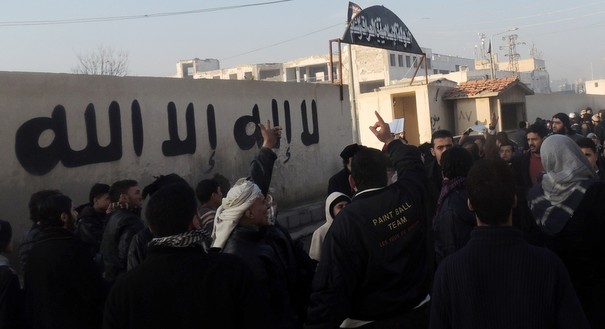In May 2014, the jihadi group the Islamic State of Iraq and the Levant (known by its Arabic acronym ISIS) released a warning to residents of some border villages in the northeastern province of Raqqa, ordering them to vacate their homes or stay and face severe consequences. Dozens of Kurdish families had no choice but to flee and leave everything behind. The incident was a reminder for the Kurdish population in Raqqa province that ISIS is determined to finish off its long war against Kurds.
Raqqa province, like many other regions in Syria, has a very diverse population. Sunni Arabs are the majority, but Kurds and Christians make up a significant percentage as well. Since the militarization of the Syrian uprising, Raqqa has been a strategically vital region for all armed groups. For ISIS, it has become a hub where its militants are gathered and dispatched to other battlegrounds across the country. Its proximity to the Iraqi border allows ISIS to operate at liberty on different fronts. On several occasions men have been dispatched back and forth between the two countries based on shifting battle needs. In May, local media reported that large numbers of ISIS combatants left to conduct operations in Iraq presumably in an attempt to disrupt the parliamentary elections, which were held on April 30.
As for the Kurds, Raqqa has always been considered a natural extension of their lands. Historically, Raqqa was never part of any Kurdish-controlled emirate. However, smaller parts of the province along the border with Turkey have been populated with Kurds for centuries. The Baathist regime attempted to change the demography of these Kurdish-dominated areas by resettling Arab tribes. When Raqqa was liberated from regime forces, Kurds were quick to realize the importance of the province for their future. While they couldn’t make advances in Arab-majority areas, the People’s Protection Units (YPG), the dominant Kurdish armed force in Syria, has been able to make some significant gains in villages where Kurds make up the majority such as those surrounding the border town of Tell Abyad. Despite continued battles between the YPG and ISIS, these areas remain outside the absolute control of either group.
As the first capital city to be liberated from regime forces in March 2013, control of Raqqa City immediately became a point of contention between a number of different armed groups opposing the regime of Syrian President Bashar al-Assad, including Islamist elements. The city was initially liberated by forces affiliated with the moderate Free Syrian Army (FSA), a network of rebels fighting the regime with Gulf and Western support. Things rapidly changed however. Raqqa changed hands several times before finally coming under the control of ISIS on January 14, 2014. Rebels linked to the FSA did not have much leverage in the city, so the al-Qaeda-affiliated jihadi faction, the Nusra Front, completely overtook key posts in Raqqa such as the palace of the Baath-appointed provincial governor. After the emergence of ISIS, the Nusra Front found itself challenged and overpowered by a new, highly-organized, well-funded force.
Despite its appalling actions, anti-ISIS civilian activism in Raqqa continues. A campaign named “Raqqa is Being Slaughtered Silently” was launched by anonymous liberal activists inside and outside Raqqa to raise awareness about what has been happening in the city over the past year. The organizers of the campaign have successfully distributed more than five thousand leaflets across the city and its suburbs that catalogue the latest incidents perpetrated by ISIS.
Besides the Kurds, Christians are another group that has been hit hard by ISIS. In addition to several incidents of church burning in Raqqa, ISIS has reinvented the jizya, a form of Islamic taxation on non-Muslim communities. Under that law, Christians are obliged to pay monthly or yearly fees for living on Muslim land. Dress codes have also been imposed on Christian women—and Muslim women for that matter—by the Sharia Commission, the legal wing of ISIS that applies strict interpretations of Islamic laws.
Many locals in Raqqa accuse ISIS of collaborating with the Syrian regime. They base their claim on the fact that since taking over Raqqa province, ISIS has not engaged in any clashes with regime forces. On the outskirts of Raqqa City, the 17th Regiment base is one of few last outposts in the entire province that is still controlled by government forces. Locals say that while other rebel groups in Raqqa have been under attack by regime airstrikes on a regular basis, ISIS headquarters have not once been attacked. Similar collaboration claims have been made against the Kurds, particularly the ruling Kurdish group the Democratic Union Party.
It has been clear for some time that Damascus is not focused on the conflict in northeastern Syria. The regime has been content to stand by as ISIS and the Kurds battle each other in the north while its forces focus on fighting elsewhere in the country, particularly in the Damascus suburbs of Homs and Aleppo. As a result of this policy, local forces such as ISIS, the PYD, and local Arab tribes target each other and don’t particularly see fighting the Assad regime as their main objective.
Regardless of how events unfold elsewhere in Syria, Raqqa will continue to remain an important province for local actors. Different groups will fight for greater influence in Raqqa in order to have leverage in surrounding provinces in this oil-rich part of the country. Along the way, allegiances will shift, new alliances will form, and more groups might emerge. Ultimately, the demise or survival of Assad will determine the future of the tribal province.
Sirwan Kajjo is a Syrian Kurdish journalist.






